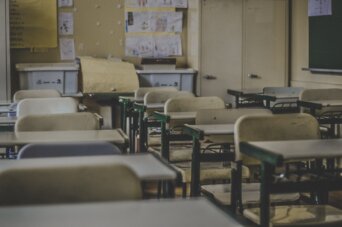- About
- Topics
- Picks
- Audio
- Story
- In-Depth
- Opinion
- News
- Donate
- Signup for our newsletterOur Editors' Best Picks.Send
Read, Debate: Engage.
| topic: | Child rights |
|---|---|
| located: | Iran |
| editor: | Gloria Rosary |
In the past three months, over 1,000 female Iranian students have fallen ill due to suspected poisonings, potentially from toxic gas. This wave of poisonings has left parents and educators concerned for the safety and well-being of their children. Yet, while anxious about the risks to their children's health, Iranian parents are also committed to upholding the hard-won right for women to pursue education in Iran.
The first incident was reported on 30 November in Qom, and since then at least 58 schools across eight provinces have undergone similar poison attacks. Many of the reports involve students at girls’ schools, but state media has also detailed at least one incident of poisoning at a boys’ school on 4 February. While no deaths have been reported due to these attacks and most of the kids have recovered within 24 hours, some students were reported to have been sick for weeks afterward.
The Iranian government's response to these violent attacks has been marked by a lack of clarity and accountability. The Ministry of Education has referred the matter to the Ministry of Health, while the latter has claimed that investigating the source of the poison and other related matters is beyond its jurisdiction. Meanwhile, the authorities admitted the attacks were deliberate, but investigations have provided no details or findings.
The distribution of the attacks in many regions of the country, the level of expertise demonstrated by the attackers in using chemical gas, and their ability to administer it without arousing suspicion or causing fatalities have raised concerns about a potential systematic attack. Authorities assert that the public may easily obtain the chemicals used, but specialists caution that the "intelligent use of mixed gases'' may be to blame for the symptoms seen in the affected pupils. The long-term effect on their health is yet to be investigated.
On Tuesday, 7 March, the Iranian government announced the first arrests of perpetrators in five provinces, without, however, disclosing any information on who the criminals may be or what their motive is.
The question of who is behind the ongoing string of schoolgirl poisonings remains a subject of intense debate: some believe that extremist groups opposed to girls' education are responsible. The regime blames its “enemies” for seeking to destabilise the country both in these attacks and the "woman, life, freedom" movement. Meanwhile, the regime’s contradictory explanation and downplaying of the attacks’ severity - which is in contrast to its prompt and decisive reaction to quash the recent protests following the death of Mahsa Amini - has raised suspicions among activists and people.
No matter who the perpetrators are, children must never be the target of ideological attacks. In light of the ongoing attacks, it is imperative that the Iranian authorities launch a swift, transparent and impartial investigation into these disturbing incidents. Perpetrators must be brought to justice, and the safety of all students must be ensured. Given the Iranian government's track-record of violating the basic rights of its citizens, it is essential that the international community closely monitor the investigation process to ensure that justice is served and that the rights of all Iranian children are protected.
Image by Feliphe Schiarolli

